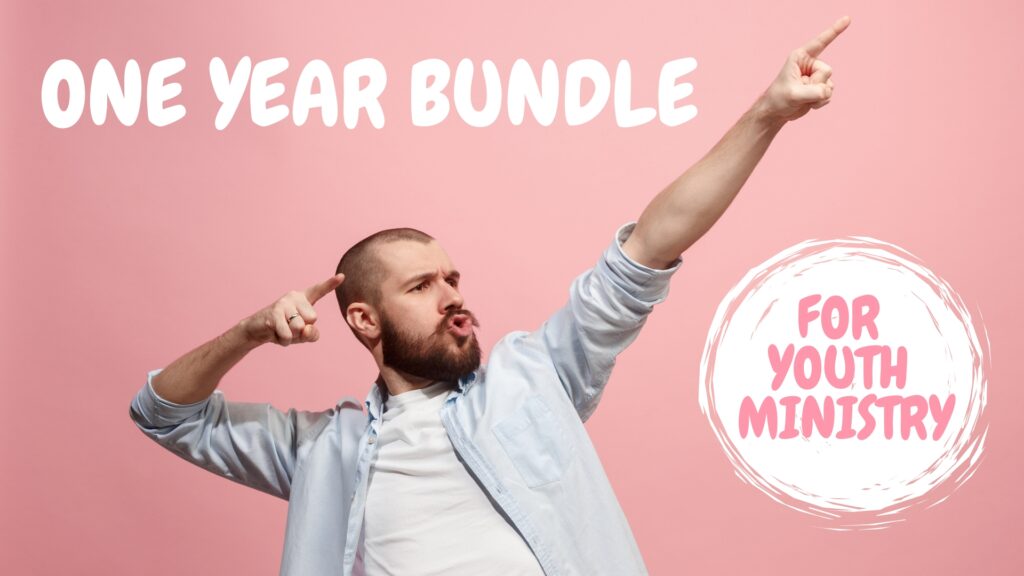YOUTH GROUP LESSON ON FORGIVENESS

Forgiving others can be tough. It can also be difficult to ask God for forgiveness for something you did. We’ve all been there.
The good news is, experiencing God’s forgiveness enables us to forgive others.
Use this lesson (see below) to help teenagers in your ministry grapple with this topic.
Before you dive into the lesson, be sure to watch this quick video I made. I share my own struggle with forgiveness & offer some ways you can help teenagers see others the way God sees them (which ultimately helps students forgive).
– Nick Diliberto, Ministry to Youth
Looking for youth ministry curriculum? Check out the…
ONE YEAR YOUTH BUNDLE – Save 79% on an in-depth and thoughtfully crafted year-long teaching curriculum for youth ministry, helping students follow Jesus and grow closer to Him.

Youth Group Lesson on Forgiveness
DOWNLOAD THE PDF OF THIS LESSON
Bible: Matthew 18:21–35; Colossians 3:13
Bottom Line: Forgive others the way God has forgiven us.
OPENING GAME: HEAD SQUARE, 9-SQUARE
Supplies: One playground ball and some masking tape for each group playing the game. We recommend setting up one playing area for every 20 players. So, if you have 100 students, then setup 4-5 playing areas.
Prepare: Here’s how to setup one playing area. Using masking tape, make one large square that contains nine small, equal squares. The nine squares should each be 4-5 feet high and wide.
How to play: This game is a modified version of four square. Here are the official rules of four square – https://www.squarefour.org/rules. For this game, players use nine squares instead of four and use their head to hit the ball rather than hands. For a detailed explanation of nine-square, go here: https://en.wikipedia.org/wiki/9-Square.
Ask the following questions after playing the game: Was it easy or hard to use your head instead of hands when playing the game? Explain.
Say: It didn’t feel natural to play with your head, did it? You might even say it was awkward, wasn’t it? Today we’re going to talk about forgiveness. And the truth is that it doesn’t come natural to us. We have to work at it. But the more we do it, the more natural it will become.
Optional: If players get real frustrated using their heads to hit the balls, then after a few minutes allow them to use their hands. But make them work for it.
TEACH
Prepare: During the teaching time, you’re going to share personal examples describing two ways people often react to someone hurting or upsetting you. Be prepared to share a time when you ignored being hurt and a time when you were hurt and you got revenge. Be prepared to also share the consequences of ignoring it and getting even.
Say – Today we’re going to talk about forgiveness. Is it easy or hard to show forgiveness to your classmates at school (or anyone for that matter)?
Think of the students in your class. Imagine you are in the classroom and take a look around at everyone that would be there with you. Do you see anyone who has ever done something to hurt or upset you? When you think about what they did to you, how did you respond?
When others do something wrong to you, you have 3 choices for how to respond.
First, you could ignore what they said or did.
This might seem like a good decision, but you never get the chance to deal with your emotions. When you hold on something, it eats away at you.
[Share a time when you ignored something and it ate away at you. Talk about how un-forgiveness affected you.]
(Optional – Show a picture of a skin infection.)
An infection can get really bad when you ignore it and do nothing about it. It can get really nasty. When we ignore a wrong done to us, like an infection, it can eat away at our souls.
The second option is to get revenge.
You could do to them the exact same thing that they did to you. Or better, you could do something even worse than what they did! I think we all know that this is not the wisest choice.
For many of us, revenge is what comes naturally. It’s like a knee jerk reaction. Your brother hits you for no reason, and you whack him on the head. A classmate at school plays a prank on you, and you get even doing something even worse to him.
[Share an example of when you got even with someone. Talk about the negative consequences that occurred.]
The third option, forgiveness, is much better than the first two.
You could choose to forgive the person for what they said or did. Forgiveness allows you to give the whole situation to God and let Him help to fix the broken friendship. Even if you can’t be friends with the other person, God can work in you to heal your pain.
Forgiveness is always the best option. It’s not just the best of the three choices; it is also a command from Jesus.
Matthew 18 tells us about a conversation that took place between Jesus and the disciples. Peter came to Jesus and asked, “Lord, how many times shall I forgive my brother or sister who sins against me? Up to seven times?” Jesus responded to Peter by saying, “I tell you, not seven times but seventy-seven times.” (Matthew 18:21–22)
The disciples must not have understood Jesus’ response, so He explained it by telling them a story called a parable.
In the story, there was a King who wanted to collect the debts of all his servants. Each of the servants had to go before the King and pay him what they owed. If they could not pay, the custom was to be thrown in prison until the debt could be paid.
One of the servants owed a great deal of money to the King. The Bible says that the debt was equal to 10,000 bags of gold! I’m going to use these buckets to represent the debt of the servant. There are 10 buckets. Each bucket represents 1,000 bags of gold that the servant owed to the King.
Place 10 large buckets or flowerpots on stage to represent the debt. Be sure to use large pots to emphasize the magnitude of the servant’s debt.
When the King learned that the servant couldn’t pay the debt, He ordered that all of the man’s possessions be sold. On top of that, the man, his wife, and his children were ordered to be sold as slaves! The servant fell to his knees and begged the King to have mercy on him.
Matthew 18:27 says, “The servant’s master took pity on him, canceled the debt and let him go.”
Can you believe that? This massive debt was just erased, and the man was free to go!
After he left, the servant went and found another man who owed him money. The Bible tells us that this man owed him around 100 silver coins. I’m going to use this bucket to represent that debt. This is nothing compared to that huge debt over there.
Place 1 small bucket or flowerpot on stage to represent the 2nd debt. Make an effort to compare the two debts and the drastic difference in amounts.
The man fell to his knees and begged for mercy because he couldn’t pay his debt. Sound familiar? Listen to what happened in the end of this story.
Read Matthew 18:30–34.
This man was forgiven so much (point to large buckets), and yet he couldn’t forgive someone else for this little amount (point to small buckets). The point Jesus was making was that we have all been forgiven for so much by God. He chose to love us and offer us forgiveness for sin. If we have been forgiven for so much, how can we not forgive a friend or classmate who has done something wrong to us?
Forgiveness is always the best option.
It’s not easy to forgive others, but it is what Jesus commands us to do. Even if the other person is not really sorry, we still have to forgive and give it over to God.
Colossians 3:13 says, “Bear with each other and forgive whatever grievances you may have against one another. Forgive as the Lord forgave you.”
Remember, we should forgive others the way God has forgiven us.
End of Lesson
SMALL GROUP
Note: This small group activity is optional and would probably work best with junior high/middle school students rather than high school students.
Supplies: Flash paper (1 per student) & Sharpie’s. You can purchase flash paper on Amazon. Just do a search for it there.
Take those sheets and cut them into fourths leaving four smaller rectangles. You can also do a search on Google for – flash paper magic. You can find multiple other sources for the flash paper.
Each student will receive a piece of flash paper and a marker (Sharpie’s work best). Ask the students to write something that someone has done to them. Something that they haven’t yet forgiven. Remember the paper is small and thin, so remind them they don’t need to write every sin, just something that represents it. Ask them to take some time and pray over the paper, praying for God to forgive those sins. Then they should bring you the piece of paper. Don’t let the students do the lighting!
You should be stationed in an area with no flammable things close by sitting or standing behind a lit candle. Take the student’s paper and pray over it. Then light just the edge of the paper and throw it into the air. The paper will burn in a flash leaving behind no ashes or other residue. Make sure you practice burning it before the students arrive. It takes a little practice to get it right.
Discuss the following questions:
What connection does this activity have with forgiveness?
Are some things easier to forgive than others? If so, what actions are easier to forgive? What actions are harder to forgive?
Have students take out their Bibles. One student reads Matthew 18:30–34 while everyone follows along in their Bible. Discuss the following questions:
What do you think is the point of the story?
Does it m ake it easier for you to forgive others knowing that Jesus has forgiven you on so many things? Why or why not?
DOWNLOAD THE PDF OF THIS LESSON
End lesson.
Looking for youth ministry curriculum? Check out the…
ONE YEAR YOUTH BUNDLE – Save 79% on an in-depth and thoughtfully crafted year-long teaching curriculum for youth ministry, helping students follow Jesus and grow closer to Him.

Liked this lesson? You’ll also like this….
Youth Group Lesson on Humility

8 Replies to “YOUTH GROUP LESSON ON FORGIVENESS”
Samuel Duiker
It is very good to make use of your studies and games,we reached alot of young people and kids in our town,Upington in the Northern Cape South Africa.
Kristy Preston
That’s awesome to hear Samuel! God Bless!
Rose
Awesome lesdon. My class loved it.
Kristy Preston
Great Rose! Thanks for reaching out to us! Let me know if I can assist you in anyway. God Bless!
Joan
What a great lesson…my youths must love this
Tacia
Awesome lesson! Loved it and my class love it!
Kristy Preston
Tacia, This is so awesome to hear!
Tee
A blessing. Thank you. Thank God